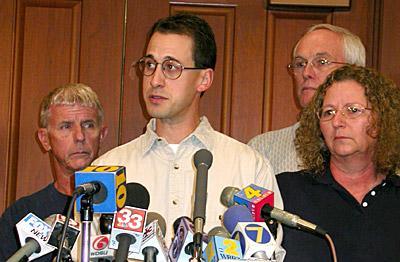Under clouds, cold and rain, a crowd gathered with signs and T-shirts again on the steps of the state capitol in protest.
It was not about war in Iraq. The signs at the rally to raise awareness about the serial killings were filled with personal messages to victims and warnings to Baton Rouge residents.
“We’re all linked together by death, and it shouldn’t be that way,” said Duaine Mouton, victim Trineisha Dene Colomb’s cousin.
The rally comes on the heels of news of Carrie Lynn Yoder’s murder. Police have not confirmed if her death is linked to the serial killer.
Geri Teasley, the rally’s coordinator, said the rallies are to keep the murders in everyone’s mind and prevent the police from being complacent.
“Everybody’s whoo, whoo until somebody else turns up dead,” Teasley said. “Sooner or later, this guy’s going to make a mistake, and we’re going to catch him or figure out what he looks like.”
Ann Williams, a professor at Millsaps College and president of the Forensic Review, said keeping the serial killer in the public eye is important because the tip that catches him could come from anyone.The more people know, the better, she said.
Two LSU graduate students wore targets to the rally to show their solidarity with the victims, because they said all women in Baton Rouge are targets, and it could have been anyone.
“It’s time to quit saying ‘Thank God it wasn’t me,'” said education graduate student Mary Hudson.
Sunday was the ninth rally, and while attendance increased since the last rally in February, some people voiced contempt and concern that more people do not seem outwardly affected by the serial killer.
Lynne Marino, mother of serial killer victim Pam Kinamore, read a poem she wrote since being disappointed with the turnout at the last rally.
The poem called “Do You Know What It’s Like?” asked if readers knew what it was like to see a husband grieve or watch a 13-year-old finish grammar school without his mother.
“Do you know what it’s like to bury a child?” she asked. “I do, and I hope you never have to know what’s it’s like.”
Brenda Sims’ and Scottie London’s sister Vivian Hartford Dickerson, or “Mrs. V” as her family’s T-shirts read, was killed in July and no arrest has been made. They said people need to take the situation more seriously, which means taking precautions such as walking in groups, carrying Mace and learning not to be as trusting.
“A lot of people have the mentality of ‘It’s not going to happen to me,'” London said.
But the message all the speakers shared was people need to take notice that it can happen to anyone and start working toward a stop.
“I know it seems out of a bad novel, but this is real and the people of Baton Rouge need to come together and say enough is enough,” said Sam Pace, victim Charlotte Murray Pace’s sister.
Mouton said at the last rally, he could count on one hand the number of people at the rally who were not a victim’s family member. While this rally had a larger turnout, many were concerned because so few students came.
“Where are the students?” asked Jackie Roberts, victim Geralyn DeSoto’s aunt. “If this were Berkley or USC, they would be rioting over this.”
Williams, along with other speakers, criticized the state’s funding priorities because while she believes the police are working hard, the state’s crime labs are underfunded, which hinders its ability to solve these and past murders.
“Here we are the richest country in the world, and our leaders say we cannot afford justice,” Williams said.
Ginger Ford, a speaker from the YMCA, encouraged the audience to vote for people who will “fund labs, not landscape art museums.”
Ed White, Kinamore’s brother-in-law, was also upset with the community reaction or lack thereof. He said he believes after four deaths linked to the serial killer and 65 total unsolved murders in Baton Rouge, the serial killer investigation needs a change in direction.
“If I was a coach and I was 0 and 62, you’d tell me to change my game plan,” White said. “We need to change our game plan.”
But as much as the event helped to raise awareness, it also was an opportunity for victims’ families — both related and not related to the serial killer — to meet and relive their own experiences.
Mona Naul lost a brother 23 years ago when he was stabbed 32 times. His murder still is unsolved.
“You learn to accept it because everyone’s got a judgment day,” Naul said. “Let’s just hope they catch him.”
Sims said for her, any unnecessary killing hits close to home.
“[The rally] is wonderful,” Sims said. “At least you know you are not in it alone.”
Call to Action
March 17, 2003

Call to Action



